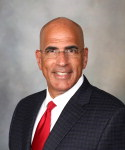Mayo Clinic, Children’s Minnesota announce cardiovascular collaboration
Mayo Clinic and Children’s Minnesota are expanding on their existing collaboration of providing cardiovascular surgical care to children with congenital heart disease to now offer cardiology care. The collaboration, referred to as the Mayo Clinic-Children’s Minnesota Cardiovascular Collaborative, began in January, building on each organization’s shared culture and passion for children, as well as the complementary strengths of both cardiovascular programs.
 “The Mayo Clinic-Children’s Minnesota Cardiovascular Collaborative is one of the largest and strongest pediatric cardiovascular surgery and cardiology programs in the country,” says Joseph Dearani, M.D. (TS ’96), Division of Cardiovascular Surgery at Mayo Clinic in Rochester. “We are proud to build on our long-standing relationship with Children’s Minnesota to provide the best care for our patients.”
“The Mayo Clinic-Children’s Minnesota Cardiovascular Collaborative is one of the largest and strongest pediatric cardiovascular surgery and cardiology programs in the country,” says Joseph Dearani, M.D. (TS ’96), Division of Cardiovascular Surgery at Mayo Clinic in Rochester. “We are proud to build on our long-standing relationship with Children’s Minnesota to provide the best care for our patients.”
By collaborating, Mayo Clinic and Children’s Minnesota can share their expertise and resources, develop and support new programs, and provide an integrated approach to pediatric research and education. As part of the collaboration, physicians from each organization will cover for each other in Minneapolis and Rochester.
“This collaboration enables Children’s Minnesota and Mayo Clinic physicians to treat increased numbers of patients with serious or complex medical conditions, with the goal to improve outcomes for our most vulnerable patients,” says Marc Gorelick, M.D., president and CEO of Children’s Minnesota.
 “We’re excited that this collaboration will expand our ability to share knowledge and expertise, and drive innovations in care delivery, experience and research,” says Jonathan Johnson, M.D. (PD ’08, PDC ’11), chair, Division of Pediatric Cardiology at Mayo Clinic in Rochester. “Ultimately, our goal is to enhance patient experience and deliver the highest-quality outcomes.”
“We’re excited that this collaboration will expand our ability to share knowledge and expertise, and drive innovations in care delivery, experience and research,” says Jonathan Johnson, M.D. (PD ’08, PDC ’11), chair, Division of Pediatric Cardiology at Mayo Clinic in Rochester. “Ultimately, our goal is to enhance patient experience and deliver the highest-quality outcomes.”
Mayo Clinic and Children’s Minnesota will continue to explore further collaborations to benefit children, adolescents and adults with congenital heart disease.